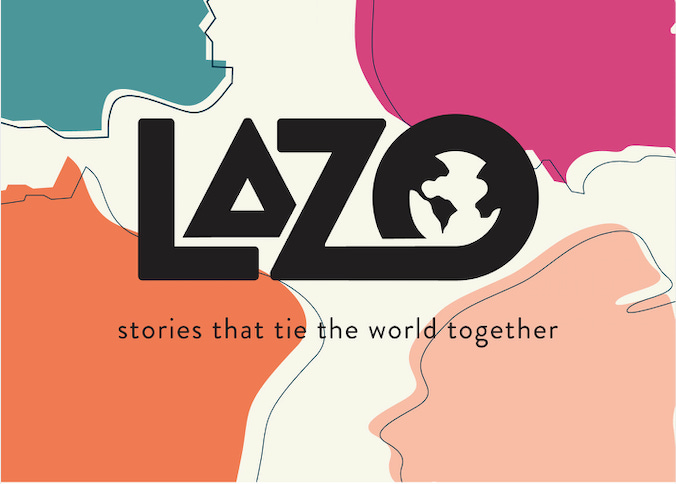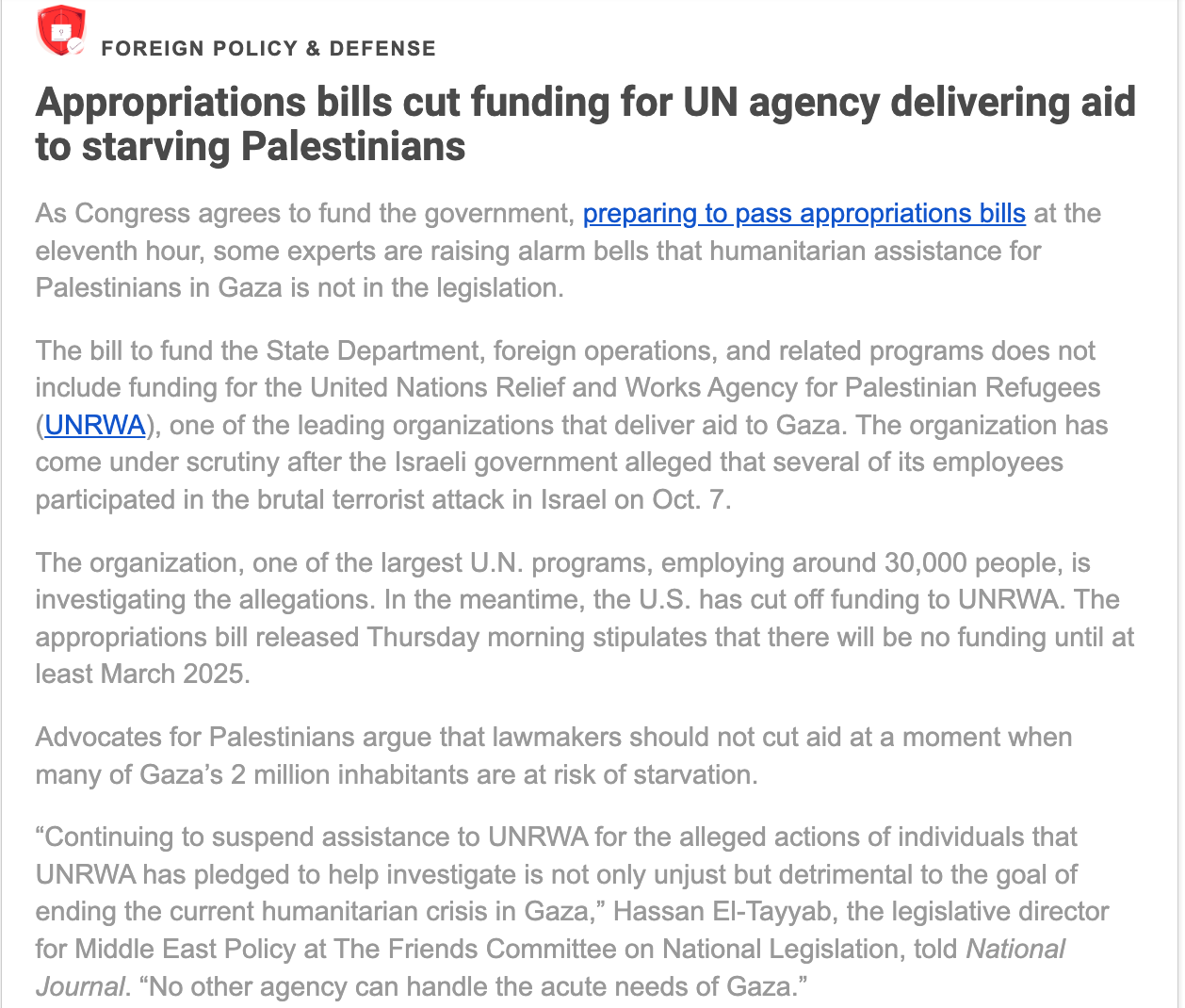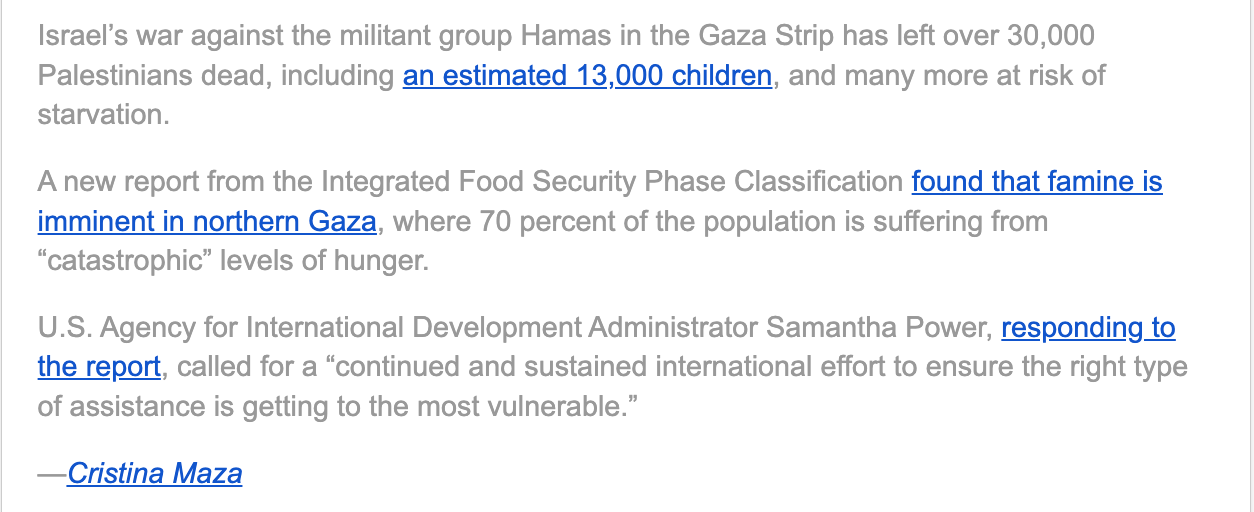It’s Sunday, and I’m imagining all of you, hopefully still in bed or back home, sprawled on the sofa after a day of sunshine and socializing. Your phone is probably in hand. Depending on your time zone, you have a coffee or a cocktail next to you, and you’re preparing to scroll through the week's news.
Friday alone was one of those wild days during which news broke around 2:00 pm in Washington about an ISIS terror attack in Moscow, the Princess of Wales announced a cancer diagnosis, and Congresswoman Marjorie Taylor Green made moves to oust the Speaker of the House, Mike Johnson. So there’s a lot to read.
Do you want to adopt a story? Huh? What is she talking about? you wonder.
A few months ago, I put out a call for pitches for Lazo Magazine, and I got, well, so many responses. Hundreds. Many of them were applications for writing jobs that didn’t exist. I’m not actually hiring anyone full-time at the moment. The whole experience gave me some insights into what commissioning editors deal with every day. And whoa. The influx in the inbox is no joke.
But many of the emails contained really good ideas. There were important stories that should be told or quirky personal narratives that you don’t hear often. The problem was I could only commission five pieces. You can read them here, here, here, here, and here.
But instead of sending outright rejections to everyone who sent a good pitch, I created a separate folder entitled ‘Stories I’d like to Commission.’
There are now 32 story ideas languishing in that folder (If I said I’d get back to you sometime in the future, your idea is probably in there).
But, like all publications, I need cold hard cash to pay the writers I’d like to commission. Ideally, I need $12,800 to commission every single story at the rate I’d like to pay. That’s a lot of money. I know. That’s why this is, unfortunately, a fundraising email.
If you are able to donate to Lazo Magazine, you can do that by following this link. I promise all the money will go to paying writers.
Here’s a list of some stories I’d like to commission. If you donate, please email me and tell me which story you want your money to support.
Future Lazo Stories:
• An on-the-ground dispatch from Liberland, a self-declared sovereign nation sandwiched between Serbia and Croatia.
• An investigation into a separatist militia that allegedly massacred a village in Southwest Cameroon.
• A profile of Luxemburg as an example of multiculturalism.
• Who are the real solarpunks? Do you want to know? I do.
• A deep dive into the Russians who have fled to Serbia since the onset of the war in Ukraine and how they’re pursuing a quiet form of anti-war activism.
• An examination of the way Zimbabwe’s regime has cracked down on dissent.
• An essay on queer identity in China.
• A profile of the forgotten migrant workers saving Italy's iconic agri-food industries.
• A story about the migrants re-populating abandoned villages in Spain.
I hope your view is something like this. The news of the week is below.
Feliz domingo, Cristina
What I’m writing:
• During her recent visit to Washington, I spoke to Estonian Prime Minister Kaja Kallas about the war in Ukraine, Europe’s defense industry, and the future of NATO. This article is unlocked and free to read.
• Plans to finance a peacekeeping mission to restore order in Haiti have fallen apart as Republicans in Congress demand more details from the Biden administration. A Congressional aid told me there was "very little" info on how funding would be used. This story is unlocked and free to read.
My weekly news blurbs:
What I’m reading:
• Writing for the Dial from Andalusia, Sofía Alvarez Jurado paints a portrait of the last ATM in a rural village where the aging Spanish population is struggling with the digitization of the financial system —and the far right is seizing the moment.
• The Washington Post details how Ukrainian writer Andrey Kurkov wrote a new novel based on discovered KGB files from 1917 to 1921, which chronicled events in Kyiv during those turbulent years, including the Bolshevik Revolution, the Russian Civil War, and a chaotic battle for control of what is now Ukraine.
• Russia held presidential elections on March 17. But Vladimir Putin's record-breaking 87 percent of the vote is suspected to have been massively falsified, Le Monde reports. According to independent Russian media, the number of stolen votes varies between 22 million and 36 million out of 76 million voters.
• Thousands of Russians went to polling stations at noon, heeding the late opposition leader Alexei Navalny’s call for a “Noon Against Putin” protest. They formed long queues in Moscow, St. Petersburg, Novosibirsk, Ekaterinburg, Perm, and other cities across Russia. Russian expats also joined at embassies and consulates around the world. Novaya Gazeta has the report.
• Lawmakers in Kyrgyzstan gave their definitive backing to a bill that stands to cripple the work of nongovernmental organizations advocating for human rights and independent media, EurasiaNet reports.
• European Union negotiators struck a deal to extend trade liberalization measures for Ukraine for a year, snubbing a Poland and French-led push for tougher restrictions on grain and other agricultural imports, Politico Europe reports.
• Over the past two years, Moscow has dumped record amounts of wheat on the world market, driving down prices. But instead of directing their frustration at Russia, farmers in countries like Poland and Slovakia have turned their anger on Ukraine, Politico Europe reports.
• Armenia could face a war with Azerbaijan if it does not compromise with Baku and return four Azerbaijani villages it has held since the early 1990s, Prime Minister Nikol Pashinyan said in a video. Azerbaijan said the return of these lands, which also include several tiny enclaves entirely surrounded by Armenian territory, is a precondition for a peace deal to end three decades of conflict over the region of Nagorno-Karabakh, which Baku’s forces retook last September. Reuters has the write-up.
• EurasiaNet reports that Armenian Prime Minister Nikol Pashinyan is making “a pragmatic play to secure a border delimitation agreement with Azerbaijan.”
• Russia is exploiting ethnic tensions as Serbia threatens violence against Kosovo and secessionists threaten a Bosnian collapse, according to a Wall Street Journal Opinion piece.
• Bosnia and Herzegovina will begin European Union membership negotiations eight years after it formally applied to join the bloc, the BBC reports.
• Al Jazeera has an explainer on Slovakia’s presidential elections, which are being framed as a choice between Russia and the West.
• The European Union announced a 7.4 billion-euro aid package for Egypt to curb irregular migration as concerns grow that economic pressure and conflicts could drive more migrants to Europe, the Associated Press reports.
• British Prime Minister Rishi Sunak’s flagship Rwanda deportation bill is expected to be put on hold until at least April after the House of Lords inflicted seven defeats, the Guardian reports.
• Catalan leader and Member of the European Parliament Carles Puigdemont announced he’s running for the Catalan presidency in the snap regional election on May 12, Politico Europe reports.
• Portugal’s president invited center-right politician Luís Montenegro to form a minority government, the BBC reports. The Democratic Alliance won snap elections this month but fell short of winning a majority in parliament after it rejected working with the far-right Chega party, which won a record number of seats.
• Israel denied Philippe Lazzarini, the chief of the U.N. agency that supports Palestinians (UNRWA), entry to the Gaza Strip, according to the agency and the foreign minister of Egypt. A new report found that famine is imminent in northern Gaza, where 70 percent of the population is suffering “catastrophic” levels of hunger.
• Israeli security officials are quietly developing a plan to distribute aid in Gaza that could eventually create a Palestinian-led governing authority there, Israeli and Arab officials said, prompting fierce backlash from Hamas and intensifying divisions in Israel’s war cabinet, the Wall Street Journal reports.
• Yemen’s Houthi rebels reassured Russia and China their ships can safely travel through the Red Sea, according to Bloomberg. In return, Beijing and Moscow pledged “political support” to the Iran-backed militant group.
• Cubans have taken to the streets to protest against electricity and food shortages, El País English reports.
• Attacks flared in Haiti’s capital of Port-au-Prince as political groups appeared closer to finalizing a transition council to take over from an absent government, Reuters reports. A police operation killed the head of the Delmas 95 gang, Ernst Julme, who had recently escaped from prison in a jailbreak.
• Hong Kong’s legislature unanimously passed sweeping new powers that critics warned would align its national security laws more closely with those used on the Chinese mainland, deepening an ongoing crackdown on dissent, CNN reports.
• Vietnam President Vo Van Thuong resigned, making him the latest senior official to step down amid widening probes into some of the country’s top leadership. Bloomberg has the story.
• Authorities arrested a key Indian opposition figure, Arvind Kejriwal, over an alleged corruption case, a move his allies claimed was politically motivated just weeks before the country votes in the world’s largest democratic election. CNN has the story.
• Niger’s junta ended a military agreement that allowed U.S. personnel to be deployed in the country for counterterrorism work, the BBC reports.
You can write to me for any reason: c.maza@protonmail.com










